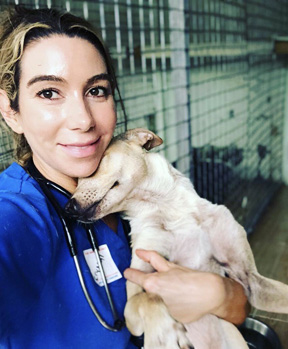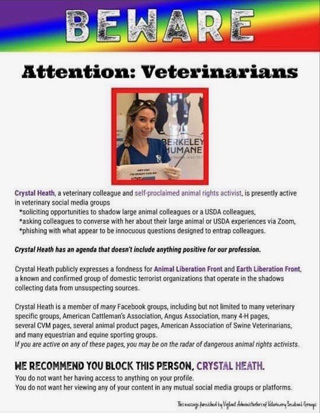Dr. Crystal Heath says she's maligned by colleagues for philosophical beliefs
Heath with dog

Photo by Dr. Crystal Heath
Dr. Crystal Heath of California volunteers at animal shelters as far away as the Fiji Islands, where she cared for the dog pictured.
Dr. Crystal Heath introduces herself on Twitter as a compassionate veterinarian who's an advocate for pet adoption and animal welfare, not unlike her colleagues. But six words in her bio — "Hi Pork Board" with a winky face emoji and "Increase Corporate Transparency" — hint at her political stripes.
With roots in shelter medicine, Heath, 39, is an animal rights activist aligned with the grassroots network Direct Action Everywhere, responsible for calling unwelcome attention to animal production facilities and lately, the American Veterinary Medical Association, in an effort to highlight the conditions of food animals in agriculture.
Last April, members of the activist group surreptitiously recorded as an Iowa hog producer culled thousands of pigs by way of ventilation shutdown plus, or VSD+, which involves turning off ventilation in their housing facilities and pumping in hot air to raise temperatures enough to cause hyperthermia. The swine, producers said, were a casualty of the COVID-19 pandemic, which shuttered meatpacking facilities and caused an unprecedented backlog of animals in production pipelines.
AVMA depopulation guidelines approve of VSD+ as a last-resort means for culling animals during times of crisis. Heath and others petitioned the AVMA to change its stance. Activists protested in front of the home of AVMA Chief Executive Officer Dr. Janet Donlin and barged into AVMA headquarters in Schaumburg, Illinois. In January, the AVMA House of Delegates, the organization's main policymaking body, rejected a bid to hear a late-submitted resolution on the matter but will take it up during the group's annual summer meeting.
VNS Letters

Heath, meanwhile, says she's received flak from within the profession for her ties to Direct Action Everywhere, known by the acronym DxE. She's banned from some professional groups on social media, and warnings about her have circulated, calling her a "liar" and her activism "deranged." "Your name is literally toxic," a colleague stated in a recent Facebook message. Accounts with handles such as hypocritedvm and crystal_the_hypocrite have been created by others with her likeness on Instagram.
Feeling excommunicated, Heath said she's taken the backlash hard. "I feel like I can't reach out to my colleagues," she told the VIN News Service. "I've cried; yeah, I've cried about that."
Seeking a fresh start, Heath left her job at Berkeley Humane in September and is doing relief work and caring for horses. The questions and answers that follow are derived from email and telephone conversations during the past three months.
Tell me about yourself: How did you come to be an animal rights activist?
Most people, particularly those whose passion is animal care, are advocates for animals. When we try to live out those values and create change, we often face backlash.
When I was a child, my uncle, who was a racehorse veterinarian, spoke out against unethical practices in the racing industry, such as rampant drug use, in Sports Illustrated. He faced a lot of criticism because of it, but it brought a lot of awareness to the problem. My whole family really respected him for being true to his conscience despite the detrimental effect it might have had on him. I think my uncle planted a seed in me.
Our profession has made many improvements in our relationships with animals. Recognition of the pain experienced by animals has increased in importance in recent years and is now one of the key guiding principles of our practice. As our knowledge grows, our profession has come to recognize that alleviation of suffering is part of our core mission as veterinary professionals.
Shelter veterinarians, in particular, have come to advocate for the five freedoms. These are the freedom from hunger and thirst, freedom from discomfort, freedom from pain, injury and disease, freedom to express normal behavior and freedom from fear and distress. Public outcry about abusive practices drove this, but veterinarians played a key role, too.
Heath flyer

Image courtesy of Dr. Crystal Heath
Flyers warn veterinarians to shun Dr. Crystal Heath or risk exposure to gotcha activism related to an animal rights agenda.
Click here for a larger view
So while you might call me an activist, the reality is that I am a veterinarian, first and foremost, and it is the veterinarians who have the power to push for important changes in our relationship with animals.
Have veterinarians turned against you for your activism? If so, describe moments in which that happened.
In fact, I've been heartened by the outpouring of support I've received from so many veterinarians who've wanted to become involved with Our Honor [a support group for veterinary activists] after hearing my story. It is inspiring to see the movement toward integrity, accountability and facts over the misinformation perpetuated within the veterinary field by corporate influence. The hateful comments I have faced have mostly been from anonymous voices online, and I am very skeptical of their origin. The animal agriculture industry, sadly, has a long history of smearing its critics.
Is there a divide between veterinarians who believe that animals should have rights and those who don't? If so, why?
Every veterinarian I have spoken to cares about animals and believes they have interests independent of the profit they can make for corporations. This is why we became veterinarians; we don't want to see animals hurt. If you believe that, then you believe in animal rights in some form.
Corporate entities, however, have mastered the ability to control public opinion through political influence, lobbying, infiltrating our educational systems, and marketing. The majority of veterinarians are reasoned individuals who care about the social good over corporate profits. Committing our profession to open communication and working to end polarization is what is desperately needed in order to create more compassionate systems that will protect our environment and stop animal suffering.
What is the distinction between animal rights and animal welfare? Some believe the animal rights movement interferes with animal welfare. Can you talk to me about that?
The two go hand-in-hand. We can't improve the welfare of animals unless we give them basic legal protections and standing. Animals don't have meaningful rights if their welfare is not being protected.
I recently discussed these views with Rick Pitman, the owner of Pitman Family Farms who purchased Norbest, one of the largest industrial turkey producers in the country. He says the efforts of animal rights activists have improved things at Norbest, and working with the activists had been a win-win for him. I was with him when he released 19 turkeys on November 23rd to Direct Action Everywhere. This was the third such release in three years to activists facing felony charges related to entering his facility, filming the living conditions of the turkeys and removing sick and injured individuals so that they could receive medical treatment. This kind of open communication between those coming from different ideologies is vital to increasing transparency and changing our systems. Instead of attacks, we should be working together.
Is veganism required of animal rights activism?
The American Veterinary Medical Association provided the following statement in response to Dr. Crystal Heath's comments:
There shouldn't be any gatekeeping on those engaged in any kind of activism. Whether advocating for LGBTQ rights, voting rights, human rights, civil rights or animal rights, those working to improve society, are — by definition — activists.
Do you respect the opinions of colleagues who do not subscribe to the idea that using animals is amoral and unethical?
While I have multitudes of respect for those who have joined the veterinary profession, I have no respect for those who value profits over truth and compassion for others.
It is hard for me to believe that my colleagues would, in good faith, advocate a practice such as ventilation shutdown – where animals are slowly killed over many hours by hyperthermia and suffocation. Yet the industry touts the AVMA's endorsement of this practice. VSD is one example of many policies, however, that are not in alignment with our values as veterinarians, which is why I am on the founding committee of Veterinarians Against Ventilation Shutdown.
We need to have more open discussions on these topics within our profession. There were those who believed that exploiting vulnerable humans was moral and ethical. As humanity's awareness evolves, we try to repair past injustices as we move forward. When it comes to animals, veterinarians have a crucial role in this process.
How do the actions taken against you differ from those taken against Dr. Jan Donlin, AVMA executive vice president, in which members of Direct Action Everywhere picketed for days in front of her personal residence?
I am a private citizen being attacked by a powerful and resource-rich organization (the Animal Agriculture Alliance) for exercising my right to free speech. Dr. Jan Donlin, on the other hand, is a powerful institutional decision-maker who refused any dialogue regarding a cruel practice that caused immense suffering and tarnished the image of our profession. She had direct power to use her voice to prevent this flagrant corporate abuse and help the animals.
Although I personally disagreed with the action in front of Dr. Jan Donlin's house, any citizen has the right to organize and push for social change as protected by the constitution.
The animal agriculture industry is a multibillion dollar industry, often at the behest of unscrupulous corporations and powerful foreign interests. They used false and defamatory attacks (e.g., alleging my affinity for "terrorists"), secret smear campaigns and personal attacks (calling me "deranged"), and even leveraging the power of my own government to try to hurt my ability to practice medicine. I did not know who was attacking me, much less what their underlying criticisms were, and the attacks against me were not made in good faith.
The protests against Dr. Donlin, in contrast, are being made by ordinary Americans who just don't want animals to be roasted alive. I am not aware of any falsehood in the attacks, or any secretive campaigns to undermine her personal character. These citizens simply wanted a person in power to do the right thing.
Many tried to open a dialogue with the AVMA, but have been met with silence so far. Considering we are stakeholders — longtime paying members of the AVMA — this is unacceptable. Public protests are an important First Amendment right often exercised in reaction to laws and policies that are unjust.
One can contrast how the AVMA and Jan Donlin addressed DxE with how poultry processor, Rick Pitman, addressed DxE. In the case of Pitman Family Farms, the interaction was a win-win. Turkeys were saved, Pitman worked to improve his facilities, and the dialogue created an important friendship that will benefit all. Silencing criticism only hurts real progress, whether it's for animals, the workers, the environment, or even the agriculture industry itself.
Has your membership in the organization Direct Action Everywhere impacted your career as a veterinarian? If so, how?
I am fortunate enough to make a good living doing the work that I love — helping animals. Many corporate and industry groups have tried to tarnish the reputation of Direct Action Everywhere and their members. However, despite these attempts, the friends I have made in DxE have provided me with powerful connections with journalists, politicians, lawyers and other professionals. One such positive interaction I had with a city councilmember resulted in my becoming a commissioner for the city of Berkeley.
Both the Berkeley City Council and the San Francisco Board of Supervisors have now passed resolutions supporting DxE activists. Their investigatory work has been covered by Wired Magazine, The New York Times, ABC's Nightline, Ezra Klein of Vox, Pulitzer Prize-winning journalist Glenn Greenwald [in] The Intercept, among others. Their work has been some of the most effective activism I have ever witnessed and I believe history will show they are on the side of compassion and progress.
What do you want other veterinarians to know about your professional intentions and activism?
The biggest threat to our profession and the goals of One Health is an industry and government working together to limit transparency at the expense of worker safety, animal well-being and the environment. It is our responsibility as citizens to keep these institutions adherent to and work towards a future that embraces more compassion-oriented systems. By making our voices heard and working together, we can push for a more conscientious society where life and well-being are valued. I co-founded Our Honor to tell the stories of other professionals who followed their conscience and worked to create more compassionate systems.
If anyone has any questions about my personal beliefs or goals, I would encourage them to reach out to me directly. You can email me at cheath@ourhonor.org, and we can arrange a time to discuss these issues over the phone or in person. Context and tone can be lost over text and print, and one can forget they are talking to an individual with their own unique life experience.
Are you operating with genuine curiosity and collegiality when you ask online communities to shadow a food animal practitioner or inquire whether veterinary programs conduct terminal procedures on animals for educational purposes?
I've been involved with horses, goats, sheep, pigs and poultry ever since I was a small child. I was also an avid equestrian, competing regularly in dressage and three-day eventing, and I was on the UC Davis equestrian team. From middle school through high school, I was involved in 4-H and was vice president of the Morgan Territory 4-H club. My sister keeps sheep and poultry, and I have many friends with pigs and cows, so I have a lot of interest in learning about veterinary care for large animals and farm animals.
When I was invited to shadow a shelter veterinarian many years ago, it changed my understanding of working in shelter medicine and made me want to pursue shelter medicine as a career path. Now, I'm genuinely curious as to why livestock animal veterinarians are so much more suspicious of having veterinarians shadow them, whereas shelter veterinarians are quite open. I'd like to learn about their field — not only to help the rescue farm animals I'm involved with but to learn more about the industry. I believe sharing knowledge and open dialogue is important for broadening our understanding and connecting with our colleagues. My open dialogue with activists has corrected some misconceptions certain individuals held about veterinarians and animal shelters. I also believe in the goals of One Health and how open communication is vital to achieving optimum health of the planet and everyone in it.
As far as terminal surgeries and other practices in veterinary teaching, such as injecting a dog with a substance to induce anaphylaxis, and exsanguinating animals so students could have that firsthand experience, I wanted to understand why might some schools still feel the need to continue these practices while others have stopped.
After many veterinarians came to me with their own stories of having to resist or even betray their conscience in their education or practice, I realized that they all needed assurance that they were not alone in their beliefs. Our Honor will help raise awareness about these issues and encourage institutions to adopt more compassionate systems and practices.
Some veterinarians are wary of your intentions. How do you respond to that?
Corporate and political institutions have been actively working to polarize us, not just in the veterinary profession but in broader issues as well. I remember when I was in 4-H, and then a student at UC Davis as an animal science major, and finally a veterinary student, I was taught that "animal rights activists'' were "dangerous" and spread lies and misinformation. My co-worker, who is in RVT [registered veterinary technician] school, recently showed me slides from her animal science class that say animal rights activists "often misinform the public, use violence and stunts in order to receive donations for their organizations." In reality, it is the powerful corporate and political interests that use their influence to spread misinformation to protect their status and short-term profits. I can understand why some veterinarians have been influenced by a very persuasive agenda that's geared towards prioritizing short-term profits over the greater good.
Do you consider it ethical to keep animals as pets?
Yes. As our circles of compassion broaden to include more groups, humanity will shift from an ownership model of human-animal relationships to a more family/guardian/caretaker model. There will always be those who need caretakers — whether they are homeless domestic individuals, orphans or injured non-releasable wildlife. These interspecies bonds are very important for the benefit of everyone.